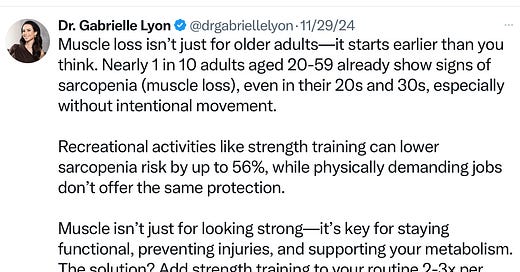Rule #6: Fitness is your Second Superpower
I know all of you are thinking: “What took you so long?” I love fitness, but I have been working out my whole life and have never felt as good as I do now—well maybe in my 20s. So what changed? Diet. I learned that you simply can’t exercise your way out of a bad diet. That is why fitness is not Rule #1.
But if you want to enjoy life as you age—fitness is critical. And it has the added benefit of promoting longevity. For example, a person who does a muscle-strengthening workout for 30 to 60 minutes per week reduces their chance of all cause mortality by 10-20 percent.1 They also reduce their chance of getting cancer and heart disease compared to those who do not do strength training.2
I-Min Lee, a professor of epidemiology at Harvard T.H. Chan School of Public Health, pointed out that muscle-strengthening “exercises also improve glucose metabolism, enhance maintenance of healthy body weight, and help improve cardiovascular risk factors such as blood pressure.”3 She noted that “all these factors lead to lower risks of cardiovascular disease, cancer, and diabetes, which lowers mortality risk.”4
And for all of you that are chronologically younger than me, look at what Dr. Gabrielle Lyon is saying:
Exercise also helps you retain brain function by, among other things, reducing your risk of cognitive decline and dementia.5 What’s more, it has been shown to do the opposite: constriction of muscles causes the transcription of the longevity protein Klotho!6 So if you want to reduce your biological age, go to the gym!7
Women often say they don’t want to bulk up so they don’t lift. But as Dr. Mary Claire says, “You are never going to bulk up unless you do so purposely.” And even heavy lifting only builds lean muscle, improves strength, and helps us lose fat. Dr. Claire points out that after 30, “women naturally lose bone density and muscle mass, increasing osteoporosis risk.” So lifting is a must, and Dr. Claire gives you a plan that everyone should follow.
But what about cardiovascular fitness, flexibility, and balance? Of course, those are critical too. And I plan to get into those in future posts, but I could write on fitness forever and I want to do individual posts for each with individual challenges. I know that many of us are runners or peloton riders etc. But we also need weight training. It is often the most overlooked part of fitness for many.
My challenge to you: For the next few weeks, do either three 30 minute sessions of strength exercises or six 15-minute sessions. And if you don’t belong to a gym that is not an excuse. You can do body weight exercises like squats, pushups and even burpees. Plus, you can find many more exercises online. There are also plenty of free apps out there with a lot of exercises on them.
If you want something simple, get out of bed in the morning and do 10 body-weight squats and 10 pushups. Do 1 set the first day and add a set each day until you get to 10 sets of 10. Then do that for a while and when it becomes too easy start adding again until you get to 20 sets of 10. Trust me you will see and like the results and feeling you get.
In a perfect world, you would start with a personal trainer since form is critical. If you take classes with a good instructor and ask them to watch your form, they will. A lot of the classes taught at the gym have the added benefit of working in both cardio and strength.
I finish with this recent post from Max Lugavere about an extensive study of the benefits of exercise.
See you in the gym (I hope)!
https://hsph.harvard.edu/news/strength-training-time-benefits/#:~:text=However%2C%20Lee%2C%20who%20was%20not,%2C%20which%20lowers%20mortality%20risk.”
https://hsph.harvard.edu/news/strength-training-time-benefits/#:~:text=However%2C%20Lee%2C%20who%20was%20not,%2C%20which%20lowers%20mortality%20risk.”
https://hsph.harvard.edu/news/strength-training-time-benefits/#:~:text=However%2C%20Lee%2C%20who%20was%20not,%2C%20which%20lowers%20mortality%20risk.”
https://hsph.harvard.edu/news/strength-training-time-benefits/#:~:text=However%2C%20Lee%2C%20who%20was%20not,%2C%20which%20lowers%20mortality%20risk.”
https://www.cdc.gov/physical-activity/features/boost-brain-health.html#:~:text=Physical%20activity%20can%20help%20you,of%20cognitive%20decline%2C%20including%20dementia.
https://www.nature.com/articles/s41598-022-22123-1
https://www.sciencedirect.com/science/article/pii/S2451865418300310#:~:text=The%20secreted%20form%20of%20the,outcome)%20in%20sedentary%20healthy%20adults.





